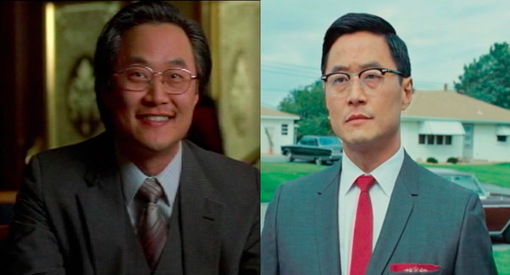Meet Steve Park. You may know him as Sonny, the Korean store owner in Spike Lee’s “Do the Right Thing” (1989) — or perhaps as a regular on “In Living Color” during the 1991-1992 season. While recently going through the Coen brothers’ “A Serious Man” (2009) with an audience for a week during the Ebert Cinema Interruptus at the Conference on World Affairs, I came to the startling realization that the Steve Park who played Japanese-American Mike Yanagita in “Fargo” (1996) and the Stephen Park who played Korean-American Mr. Park 13 years later in “A Serious Man” were one and the same.
The Coens sometimes give a single-scene appearance to a relatively minor character who provides the key to understanding (or at least defining) the film’s mysteries. In “Miller's Crossing” (1990) it’s Mink (Steve Buscemi) who, in a rapid-fire exchange with Tom Reagan (Gabriel Byrne) at the Shenandoah Club lays out the movie’s convoluted map of relationships before we can take in everything that’s being thrown at us.
In “No Country for Old Men” it’s Ellis (Barry Corbin), cousin of Sheriff Ed Tom Bell (Tommy Lee Jones), who, in the quiet scene that begins the last movement of the picture, spells out the harsh realities of the past, present and future for the retiring lawman who feels overmatched in the modern world and wants to opt out of it: “You can’t stop what’s comin’. Ain’t all waitin’ on you. That’s vanity.”
Park has the honor of appearing in two such key scenes for the Coens, years apart. His Mike Yanagita is funny, with a delectable Minnesota accent to bounce off Marge Gunderson’s, but he’s also a disturbing and even tragic figure. Mr. Park (Clive’s father) is one of many forces buffeting Larry Gopnick. And, unlike Larry, he’s a man who knows exactly what he wants, even if Larry’s rationalist worldview can’t comprehend him. (Watch the video, above.)
The non-fictional Park wrote a memorable “mission statement” in 1997 called “Struggling for Dignity,” after disturbing experiences on the popular TV sitcom, ‘Friends’:
I am a Korean-American actor. You can see my work in one of the most highly acclaimed movies of 1996 and in one of the most talked about scenes of that year. I play the distraught Japanese-American ex-schoolmate of Marge Gunderson– Mike Yanagita– in the Academy Award-winning movie Fargo. Working with the Coen brothers and Frances McDormand was one of the high points of my career. Not so much because they are brilliant artists, but because they are decent, down-to-earth people who treated me and the rest of the cast and crew with respect and admiration. […]
I just finished working as a guest star on one of the highest rated shows on television [‘Friends’], which brings me to my next point. Working with the people involved with this show was an extremely painful experience for me. A disturbing lack in generosity of spirit and basic human courtesy, in addition to a racial incident on the set, has forced me to speak out.
These people, by virtue of their status, money and power, are among the most privileged people walking the face of the earth, yet they behaved as if they were bankrupt in spirit and incapable of expressing simple human kindness. Not only did various key people on the set not have the courtesy to introduce themselves as we began to work together, they created an environment of fear and insecurity. One PA (production assistant) spoke of having worked on the show for almost a full year without one cast member ever having said hello to him in that entire time. And on top of this, the 1st AD (assistant director), in a short tirade, called an Asian-American actor to the set over a walkie-talkie with the words, “I don’t have time for this! Where’s Hoshi, Toshi or whatever the f–k his name is. Get the oriental guy!” He did not even have the respect to learn the name of the actor, a veteran of 40 years.
I was the only one who took notice, while all others proceeded as if it was business as usual. Given the atmosphere on the set, it did not feel safe to say anything. After all, on the average Hollywood set, finding a person of color is much like trying to find Waldo. It is a white, exclusionary culture. If this was an isolated incident, I would not have felt compelled to write this mission statement. Unfortunately, I find this attitude and behavior commonplace in Hollywood. I know many people who have experienced this kind of indignity on a movie or television show set, and you can be sure this kind of thing is going on in the corporate culture as well. There are many who would argue that the status and power people achieve here is part of the attraction and glamour of Hollywood, and others who climb this ladder of success and are dealt these indignities are just “paying their dues.”
No doubt Steve Park has paid some dues over the course of his career. Fortunately for us, he can also claim some indelible cinematic achievements.











